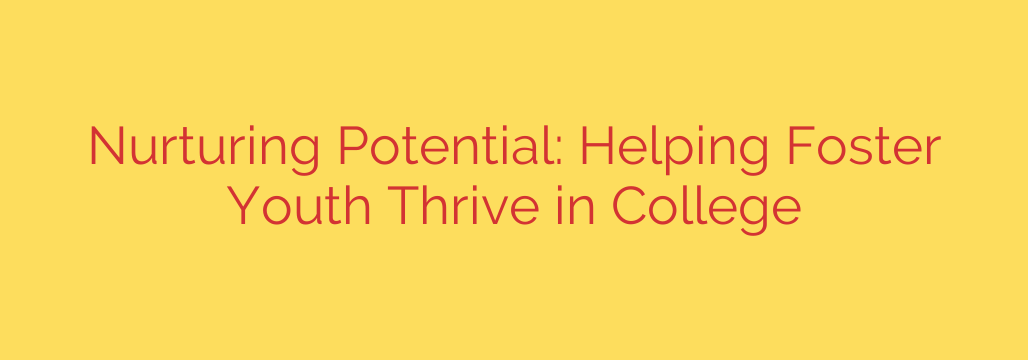
Attending college is a significant step towards building a successful future, but for youth who have experienced foster care, this journey can present unique and formidable challenges. Unlike many of their peers, foster youth often lack traditional family safety nets, stable housing during breaks, and consistent guidance through the complex college application and financial aid processes. Yet, their potential is immense, and with the right support systems, they can not only attend but truly thrive in higher education.
One major hurdle is financial stability. Navigating tuition costs, living expenses, and unexpected bills is difficult for any student, but it’s compounded for those who may not have familial financial support. Access to financial aid, including grants specifically for former foster youth, is crucial. Beyond tuition, support is needed for essential needs like books, supplies, and daily living expenses. Institutions can play a vital role by proactively identifying eligible students and connecting them with these resources.
Housing security is another critical concern. College dorms provide housing during semesters, but what happens during summer breaks, winter holidays, or unexpected campus closures? Without a family home to return to, foster youth can face homelessness. Colleges and communities need to develop year-round housing solutions or resources to prevent this disruption, which can derail academic progress and overall well-being.
Academic and social integration can also be challenging. Students from foster care backgrounds may arrive with varied educational experiences and might feel isolated on campus. Providing tailored academic advising, tutoring services, and peer mentorship programs can help bridge gaps and build confidence. Creating spaces where foster youth can connect with each other and with supportive staff can foster a sense of belonging and community.
Furthermore, addressing mental health and emotional well-being is paramount. The experiences of foster care can leave lasting impacts. Accessible and trauma-informed counseling services are essential resources that universities must provide. Staff and faculty training on understanding the unique needs of foster youth can also create a more supportive campus environment.
Practical skills development is also key to college success. Learning how to manage finances, navigate bureaucratic systems, advocate for oneself, and build professional networks are skills often learned within family structures. Workshops and dedicated programs that teach these life skills can empower foster youth to navigate independence successfully.
Ultimately, helping foster youth thrive in college requires a multifaceted approach involving collaboration between educational institutions, government agencies, non-profit organizations, and individuals. By providing comprehensive support that addresses financial, housing, academic, social, and emotional needs, we can unlock the incredible potential within these resilient young people, enabling them to achieve their educational goals and build brighter futures. Investing in their success benefits not just the individual student, but our entire community.
Source: https://feedpress.me/link/23532/17040029/room-by-room-heart-by-heart-helping-foster-youth-thrive-in-college








